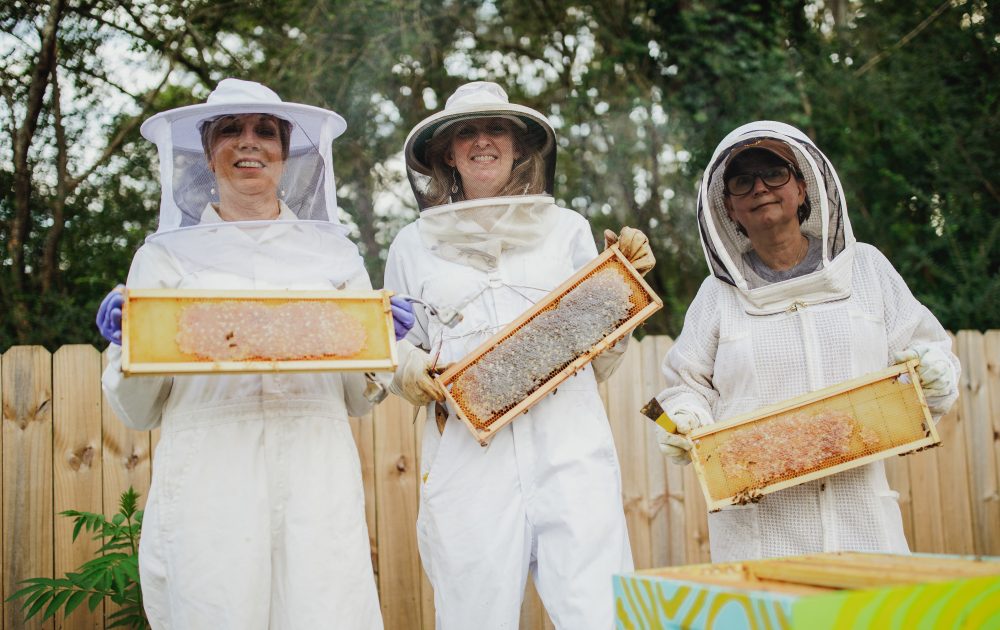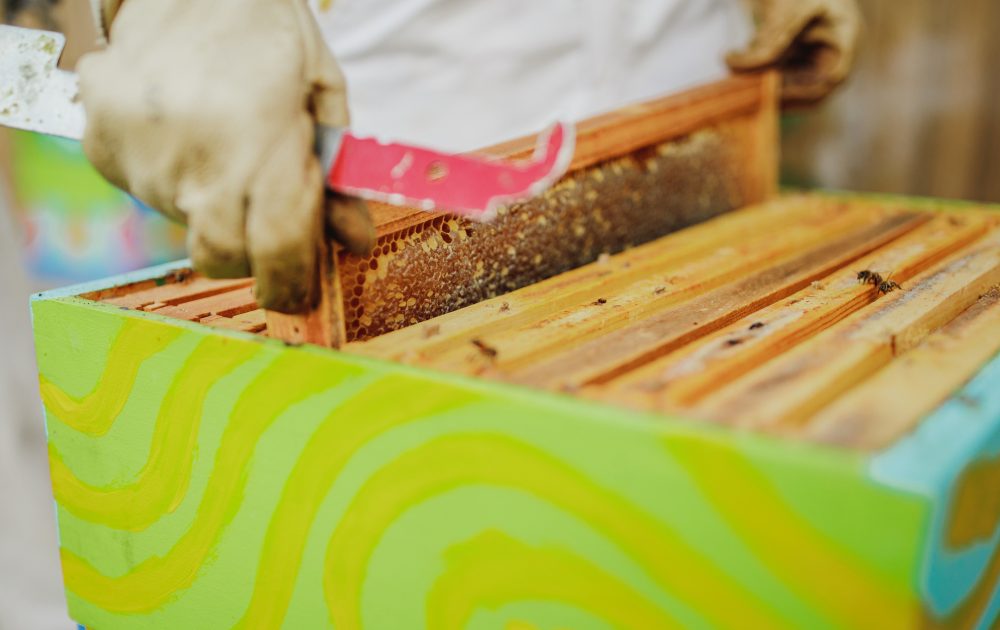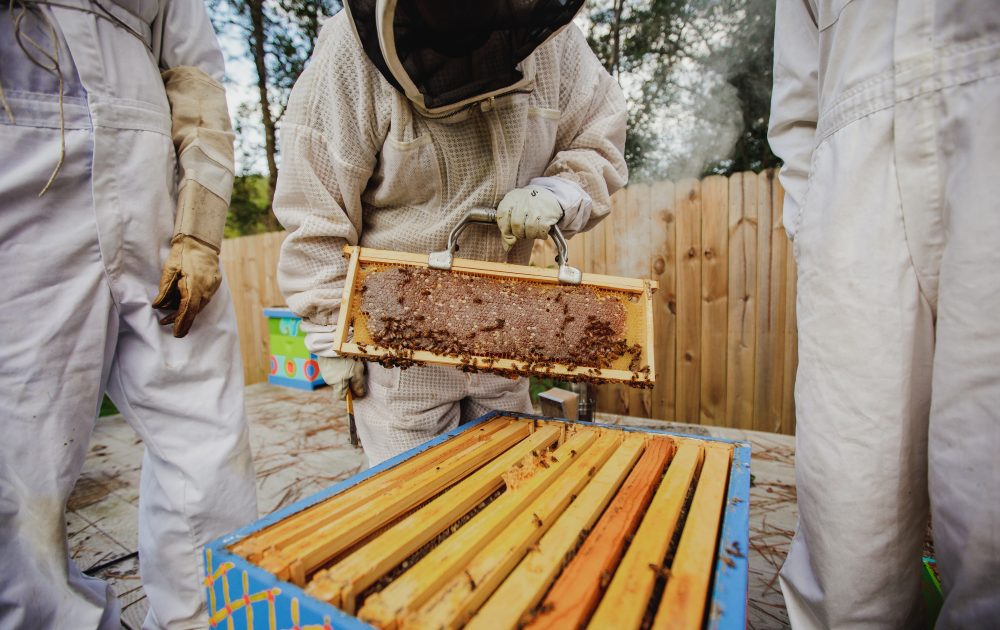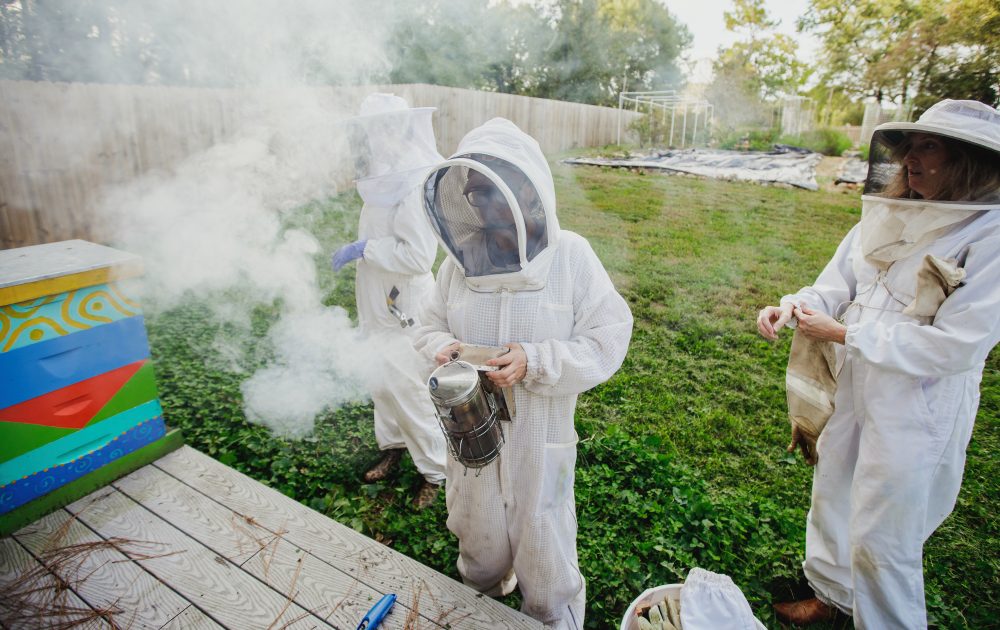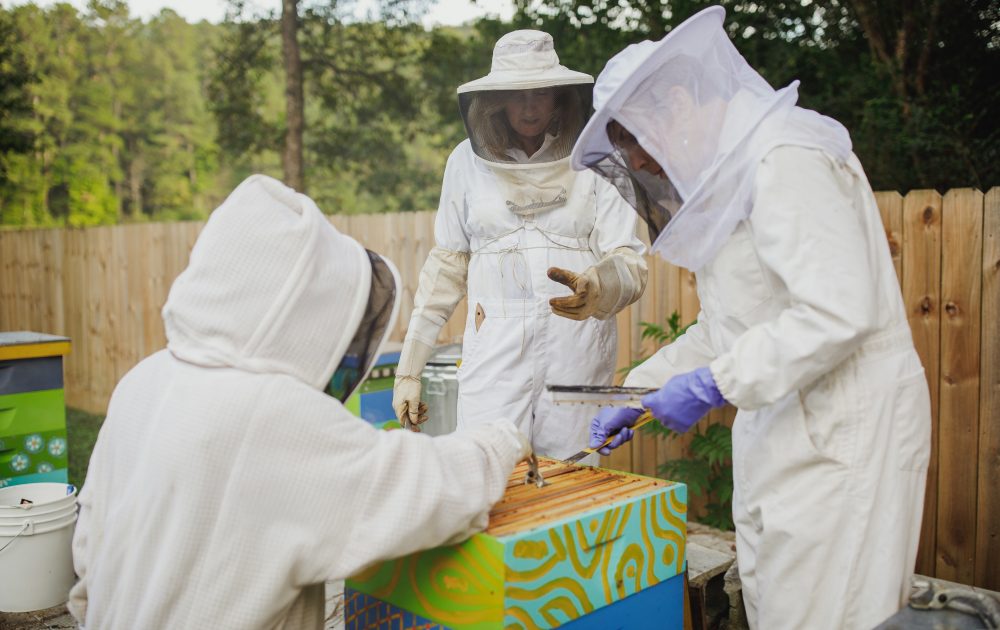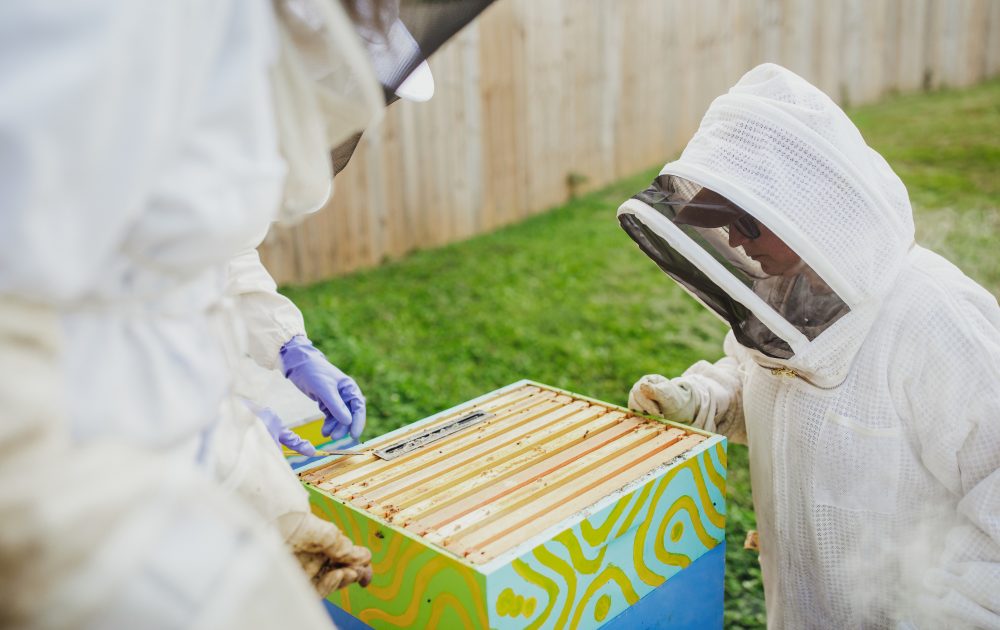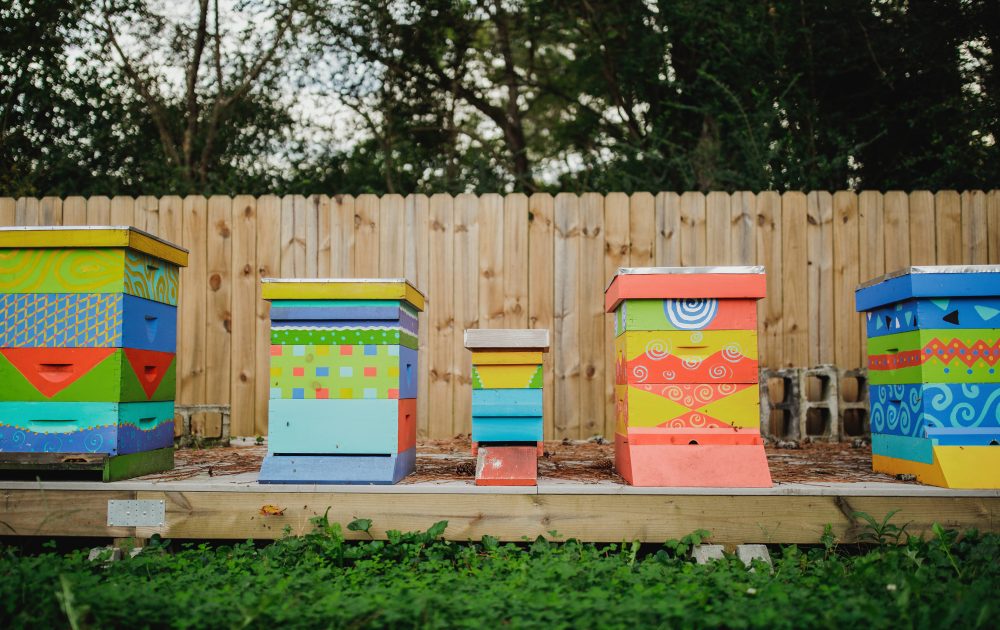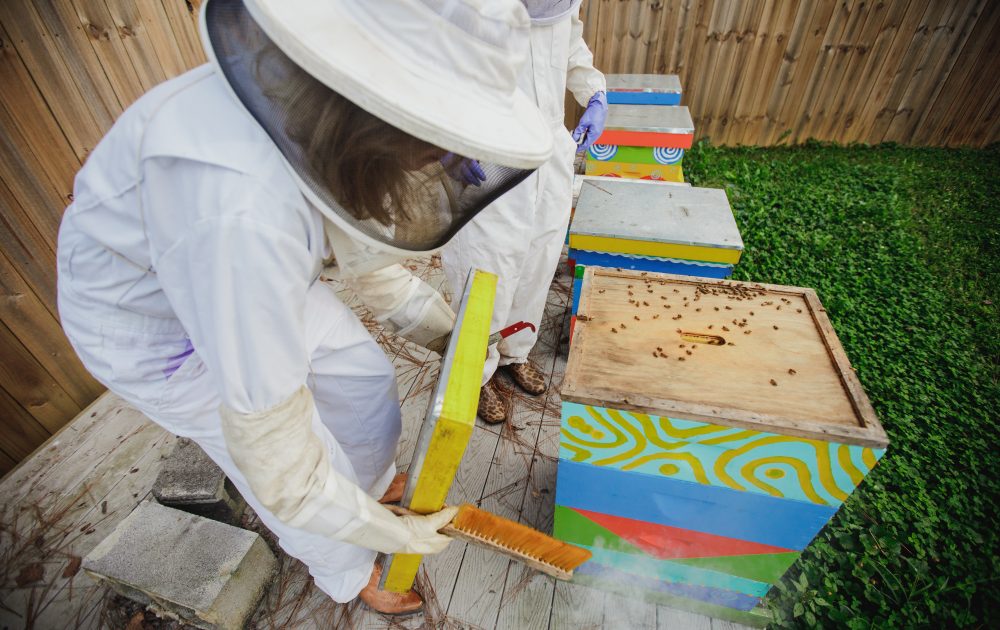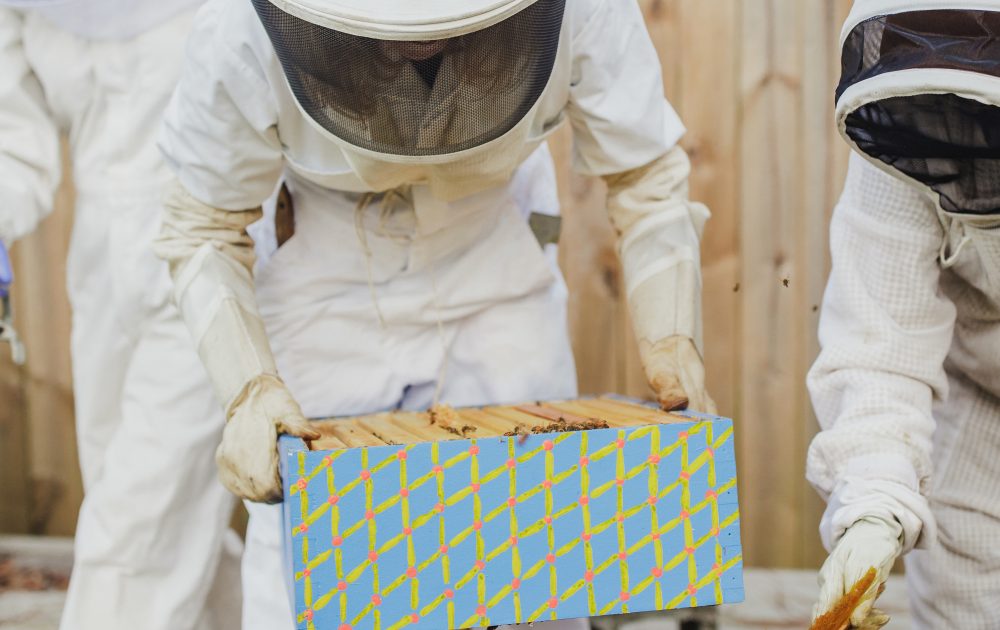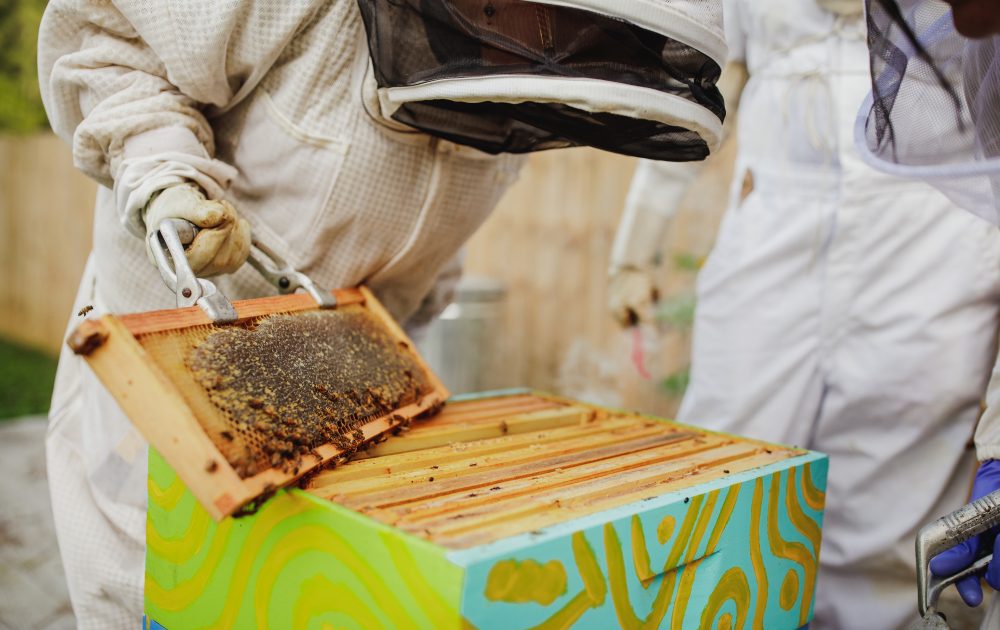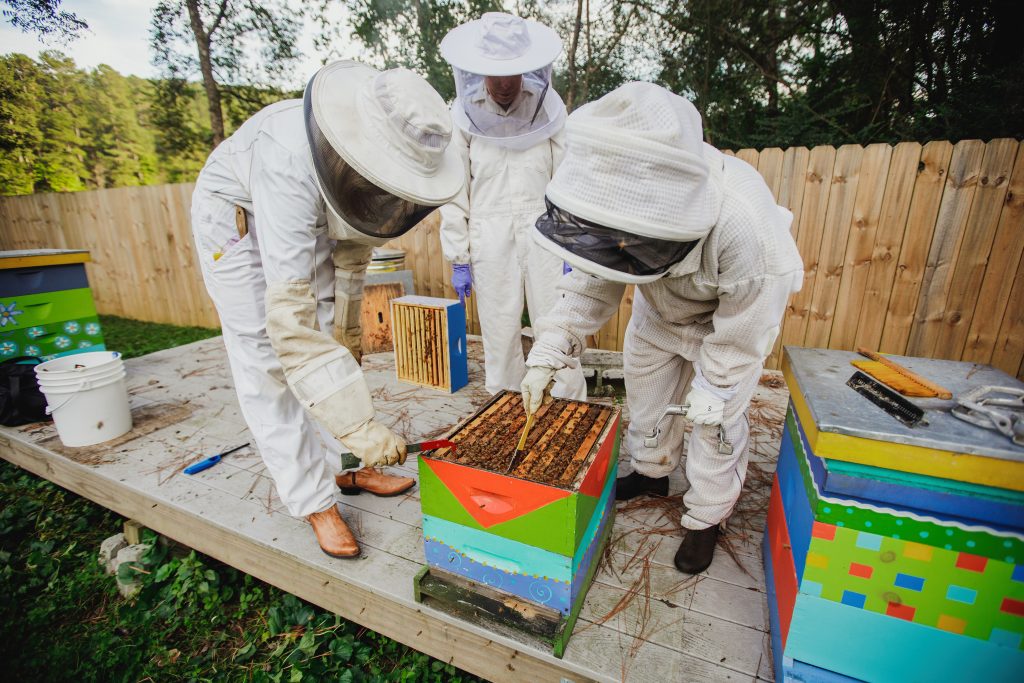
Photos Cameron Flaisch
Three Rome women did not initially join a pottery class at Earthworks to figure out a way to save the bees and our local ecosystem; but almost a decade later, that’s exactly what Anid Beyer, Denise Champagne and Monica Sheppard (also known as The BeeShees) are on a mission to do. The three locals are not just beekeepers but advocates for the honey bees and their impact on the local environment.
It all started back in 2010, as Beyer’s son headed off to college. He developed a hobby of keeping bees while at home and the process had always intrigued his mother. “You know how there are soccer moms? I had been the ‘bee mom’ for my son,” she explains.
But with Brenden away, Beyer decided to try her own hand at beekeeping. She had the bright idea to enlist the help of none other than her dear friends from pottery class.
“I knew Monica had experience keeping bees because her father was a beekeeper, and I just asked my friends, ‘I’m going to keep bees. Who’s in?’ I wanted to do it together, because it’s always more fun with friends,” Beyer says.
Champagne did not have any experience with bees or beekeeping, but she knew that it would be fun. “Especially with these ladies!” she laughs.
Sheppard came up with the name BeeShees, a moniker inspired by the musical group, the Bee Gees. So with a name and a goal that would stick, the group became official.
They purchased their first bee colonies from the University of Georgia, because those bees had been bred to combat colony collapse disorder. Yet even with these genetically modified insects, the ladies learned that beekeeping is no frivolous hobby.
Bee populations in the United States have been weakened over the past several decades by the use of chemical pesticides and new predators, such as the Varroa destructor mite that was not introduced to the United States until the 1990s. “Imagine something the size of a dinner plate attaching itself to your abdomen. That’s what these mites are like to the bees,” explains Beyer.
Monocultures are another modern inhibitor of healthy honey bees. Commercial farming of almonds, blueberries, and cranberries, for instance, only provide bees one source from which to pollinate for miles and miles around them. The problem is that bees need to get their nutrients from multiple sources; so the commercial beekeepers have been weakening bee populations through this lack of crop diversity.
Additionally, this poses a problem because wild bees and other natural pollinators are eliminated in the process, and commercial farms become entirely dependent on honey bees to sustain their crops. There are even efforts in some Asian countries to develop tiny drones for pollinating because of the fear that natural pollinators are becoming too scarce.
“People need to realize the importance of the bees,” says Beyer. “One in three bites of food you eat is insect pollinated, and without them our food supply will become greatly diminished.”
Fighting for the plight of the honey bees is one of the missions of the BeeShees. In the past year alone, the group has worked with the city and county to get Rome designated as a Bee City USA.
They’ve also partnered with the Rome Floyd Parks and Recreation Authority to reduce pesticide spraying and add acres of wildflower-filled land to local parks, which not only helps the bee population, but also saves the city money.
Another goal of the BeeShees and their multiple partnerships throughout the community is to provide education for our friends and neighbors who share our beautiful green spaces. By spreading the word, the BeeShees have helped individuals and pest control companies to stop the unnecessary destruction of honey bee colonies and to instead find them new homes with local beekeepers.
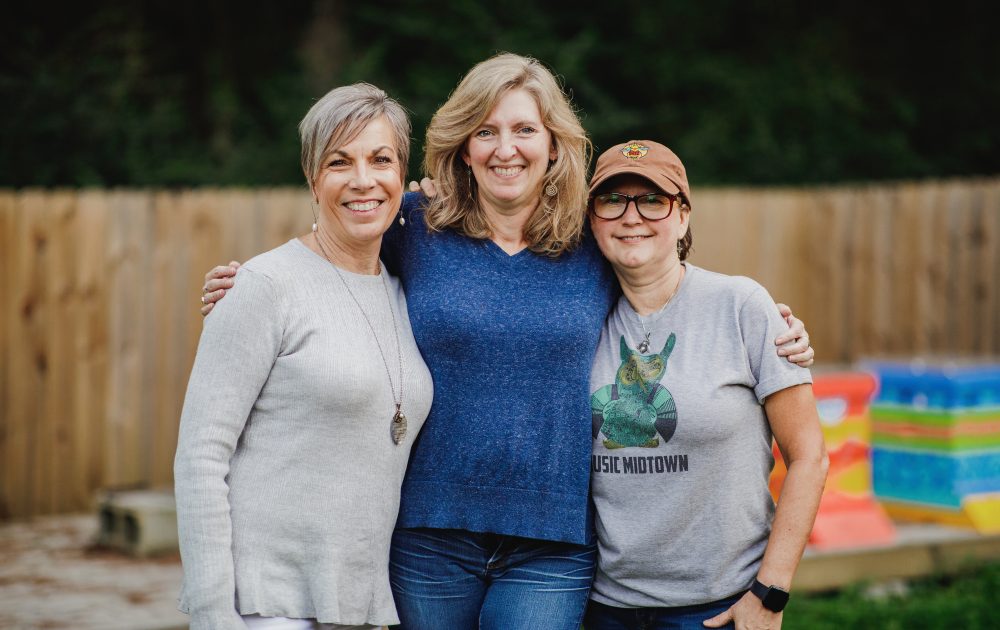
And after starting the Rome and Floyd County Beekeepers Association in 2017, the BeeShees know plenty of beekeepers. At just over a year old, there are already over 50 people involved, and the club has installed over 49 new colonies of honey bees in the Floyd County area.
The local schools have also taken notice and have gotten involved, Sheppard notes. “We’re able to teach the kids that bees are different kinds of insects, and they play different roles. And that we don’t be need to be afraid of a honey bee because it’s not the same as a yellow jacket. They don’t want to sting you,” she says.
“We also speak at garden clubs, churches, schools and more.” says Champagne. “It’s like we threw a pebble in a lake and are seeing the huge ripple effect.”
In addition to their bee projects and campaigns, the BeeShees still stay busy with their many colonies of honey bees, with hives at the South Rome Community Gardens, Rise and Shine Farms, the Community Garden, in a separate location in Cedartown and at Beyer’s house.
Despite the fact that it is laborious, the ladies thrive on the care and keeping of their bees. “We’re very involved. We’re liked their mamas,” jokes Champagne.
“We even sang them ‘It’s a Small World After All’ when they were very worked up,” laughs Beyer.
Since a healthy hive contains around 50,000 bees, the BeeShee gals work around the clock to make sure their dozens of hives are strong and in a good position to grow and swarm.
“In springtime, if a hive is super strong, then it will decide on its own that it is going to separate. And that is how they perpetuate their population,” explains Sheppard. “We can see if queen cells are being developed, and if the hive is making preparation to swarm. We can take the queen, put her in another hive, and that’s called doing a split.”
Yet with all the work that beekeeping requires, the BeeShees are able to reap its golden reward: the honey their bees produce. They call it “liquid gold,” and divide it evenly between the three of them. Each person then gets to decide what they want to sell, give as gifts, or use to make mead, honey kolsch, or other goodies. They also enjoy using the bee wax to make wraps, lip balm and soaps.
The quality of their honey and honey products is vastly different from the honey that is available in most grocery stores. “Most of that honey is totally adulterated; it actually contains Chinese honey,” says Beyer. “And it’s a big scandal, because even though the U.S. tries to prevent Chinese honey from coming in, China sends it to other countries who then ship to the states.”
This is one of the many reasons the BeeShees advocate buying and consuming only local honey. An additional benefit is that it can lessen the severity of allergies by exposing people to the allergens in small enough quantities that their bodies can fight them off.
Overall, the BeeShees enjoy every moment of their bee-caring adventures. “It’s very rewarding and great fellowship when we get together,” says Champagne.
“What I love is that honey bees are a super organism,” says Sheppard. “They function as one. Every insect is an individual, but they all have a job. I use them as an example of how a good community works: they do their jobs for the good of all.”
If you’re interested in learning more about honeybees and beekeeping, you’re invited to join the BeeShees and the Rome/Floyd Beekeepers Association for their meetings on the first Thursday of the month at 6 p.m. at the EcoCenter.
Also look for BEE ROME stickers around town and help spread awareness about the local honey bee population.

